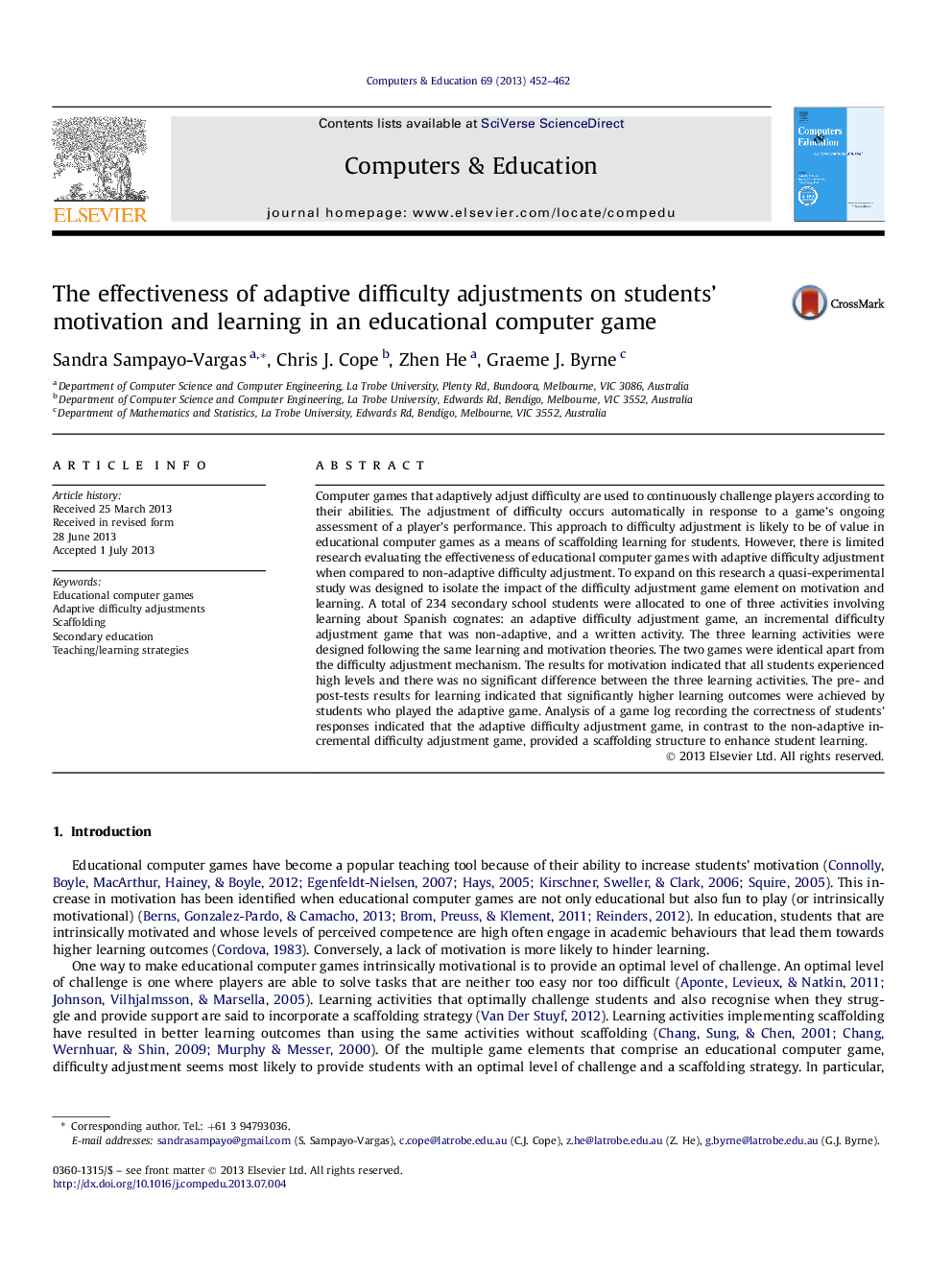| کد مقاله | کد نشریه | سال انتشار | مقاله انگلیسی | نسخه تمام متن |
|---|---|---|---|---|
| 6835501 | 618191 | 2013 | 11 صفحه PDF | دانلود رایگان |
عنوان انگلیسی مقاله ISI
The effectiveness of adaptive difficulty adjustments on students' motivation and learning in an educational computer game
ترجمه فارسی عنوان
اثربخشی تنظیمات سازگاری دشوار بر انگیزه و یادگیری دانش آموزان در یک بازی کامپیوتری آموزشی
دانلود مقاله + سفارش ترجمه
دانلود مقاله ISI انگلیسی
رایگان برای ایرانیان
کلمات کلیدی
بازی های رایانه ای آموزشی تعدیل دشواری سازگاری داربست، آموزش متوسطه استراتژی های آموزشی / یادگیری،
ترجمه چکیده
بازی های کامپیوتری که سازگارانه مشکل را تنظیم می کنند، به طور مداوم با توجه به توانایی های خود، بازیکنان را به چالش می کشد. تنظیمات دشواری به طور خودکار در پاسخ به یک ارزیابی مداوم بازی در مورد عملکرد یک بازیکن اتفاق می افتد. این رویکرد به تعدیل دشواری در بازی های کامپیوتری آموزشی به عنوان وسیله ای برای یادگیری دانش آموزان برای دانش آموزان اهمیت دارد. با این حال، تحقیقات محدودی در مورد اثربخشی بازی های کامپیوتری آموزشی با تنظیم سازگاری دشوار در مقایسه با سازگاری دشوار غیر سازگار انجام شده است. برای گسترش این تحقیق، یک مطالعه شبه تجربی برای جداسازی تأثیر عنصر بازی سازی تنظیم مشکل در انگیزش و یادگیری طراحی شده است. در مجموع 234 دانش آموز دبیرستان به یکی از سه فعالیت مربوط به یادگیری زبان اسپانیایی اختصاص یافتند: یک بازی سازگاری دشواری، یک بازی تعدیل سخت افزایشی که غیر سازگار بود و یک فعالیت نوشته شده بود. سه فعالیت یادگیری با توجه به نظریه های یادگیری و انگیزش، طراحی شده است. این دو بازی به جز مکانیسم تنظیم سختی یکسان بودند. نتایج حاصل از انگیزش نشان داد که تمام دانش آموزان سطح بالایی را تجربه کرده اند و بین سه فعالیت یادگیری تفاوت معنی داری وجود ندارد. نتایج پیش و پس از آزمون برای یادگیری نشان داد که نتایج یادگیری به میزان قابل توجهی بالاتر از دانشجویانی بود که بازی تطبیقی را بازی می کردند. تجزیه و تحلیل ورود به بازی ضبط صحت پاسخ های دانش آموزان نشان داد که بازی تنظیم سازگاری دشواری، در مقایسه با بازی تنظیم سازگاری افزایشی غیر سازگار، ساختار داربست برای افزایش یادگیری دانش آموزان.
موضوعات مرتبط
علوم انسانی و اجتماعی
علوم اجتماعی
آموزش
چکیده انگلیسی
Computer games that adaptively adjust difficulty are used to continuously challenge players according to their abilities. The adjustment of difficulty occurs automatically in response to a game's ongoing assessment of a player's performance. This approach to difficulty adjustment is likely to be of value in educational computer games as a means of scaffolding learning for students. However, there is limited research evaluating the effectiveness of educational computer games with adaptive difficulty adjustment when compared to non-adaptive difficulty adjustment. To expand on this research a quasi-experimental study was designed to isolate the impact of the difficulty adjustment game element on motivation and learning. A total of 234 secondary school students were allocated to one of three activities involving learning about Spanish cognates: an adaptive difficulty adjustment game, an incremental difficulty adjustment game that was non-adaptive, and a written activity. The three learning activities were designed following the same learning and motivation theories. The two games were identical apart from the difficulty adjustment mechanism. The results for motivation indicated that all students experienced high levels and there was no significant difference between the three learning activities. The pre- and post-tests results for learning indicated that significantly higher learning outcomes were achieved by students who played the adaptive game. Analysis of a game log recording the correctness of students' responses indicated that the adaptive difficulty adjustment game, in contrast to the non-adaptive incremental difficulty adjustment game, provided a scaffolding structure to enhance student learning.
ناشر
Database: Elsevier - ScienceDirect (ساینس دایرکت)
Journal: Computers & Education - Volume 69, November 2013, Pages 452-462
Journal: Computers & Education - Volume 69, November 2013, Pages 452-462
نویسندگان
Sandra Sampayo-Vargas, Chris J. Cope, Zhen He, Graeme J. Byrne,
